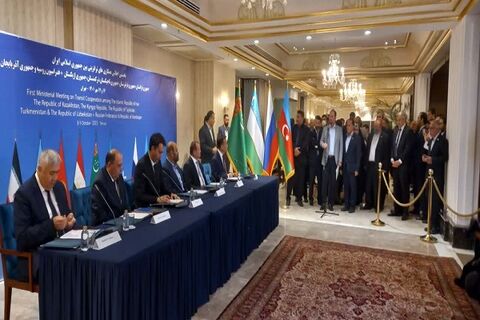Tehran, October 9 (MRUD NEWS)—Signing of the 'joint statement for enhanced transit' has been the result of the two-day ministerial summit on international transport and transit cooperation among Iran, Kazakhstan, Kyrgyzstan, Tajikistan, Turkmenistan, and Uzbekistan which has been meant to enhance and facilitate transit from/to the Central Asia through the territory of Iran.
Russia and Azerbaijan also joined the other six states in the summit held in Espinas Palace in Tehran.
Emphasizing the role of international transit and transport for the national and regional economic growth and trade expansion, the participating states reached a number of agreements.
The most important agreements include targeting 20 million tons transit across these regional countries, establishing a follow up committee by deputy ministers, simplification of visa procedures for drivers, reduction of relevant transit costs and possible removal of traffic permit, and setting joint tariffs for container rail transport.
Moreover, the countries exchanged views on the development of missing infrastructures within their national territories. In this sense during the press conference, Iran's minister, Rostam Ghasemi, informed of finalization of contracts for two rail projects namely Rashat-Astara and Chabahar-Zahedan railroads in the upcoming months. These two projects complete the International North-South Transport Corridor.
All countries supported connecting the land-locked Central Asian countries to global market through the existing and potential corridors and routes.
The parties also held bilateral and trilateral talks on the sidelines of the summit for further coordination.
The participating states welcomed Iran's initiations for holding multilateral ministerial summit on international transit cooperation and subsequently Kazakhstan’s Minister of Industry and Infrastructural Development, Uskenbayev Kairbek Aitbayevich, proposed to host the next ministerial meeting in 6 months.
Iran's current Government in office has pursued active transport diplomacy with the neighboring countries which is reflected in 60 percent increase in transit capacity.
